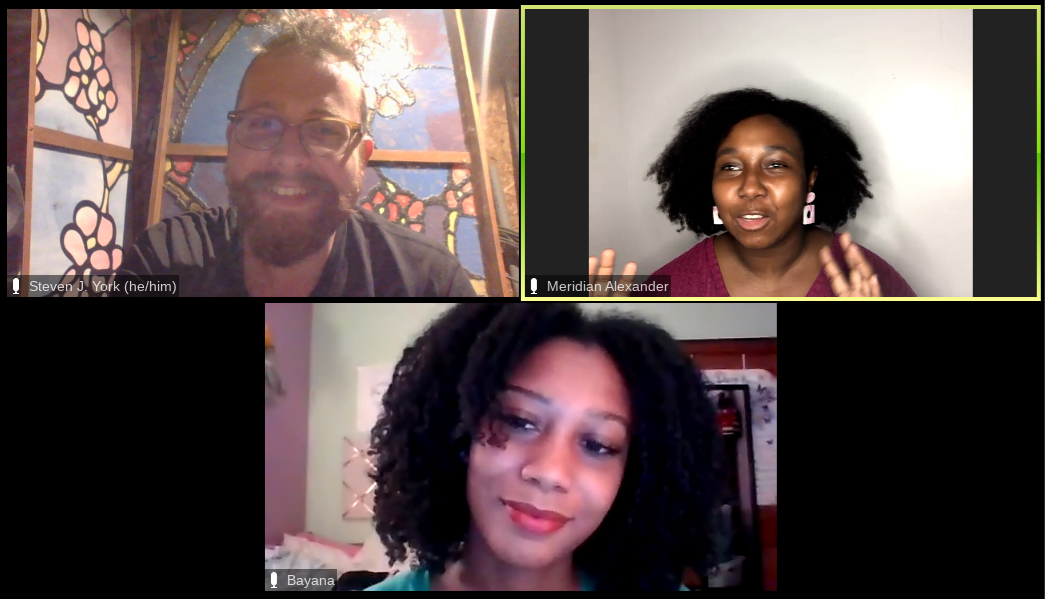Virtual theatre -- “In the Cotton,” which opens the SUNY Oswego theatre department season by tackling the serious topic of racism, has required new ways of thinking and teamwork in preparing for its virtual run Sept. 25 to 27. Clockwise top left are director Steven J. York; Angel Tyler, who plays Meridian; and assistant director Bayana Burnell.
“In the Cotton,” which opens the SUNY Oswego theatre department season by tackling the serious topic of racism, has required innovative teamwork to be ready for its virtual run Sept. 25 to 27.
Directed by theatre faculty member Steven J. York, “In the Cotton” is driven by a racially motivated hate crime on a college campus, and the fallout as students and administrators take sides. The result in the award-winning play written Morgan McGuire is conversations and explorations on racism, hate, protest and related threads.
“I think it’s important because regardless of your background, everyone has had some experience with race, and this play gives a pretty diverse interpretation on those experiences,” said assistant director Bayana Burnell, a senior theatre major. “And it gives a better insight and understanding of how people deal with that, and how people view it.”
The play is about “making sure that you’re always doing what’s right, no matter what the stakes are,” said Angel Tyler, a senior music major who plays Meridian. “We all have different circumstances that we come into when we are faced with ethical decisions, and ultimately we have to do what’s right and what we can live with, and a lot of the characters have to do that.”
The rest of the student cast includes Colby Robertson as Mark, Kamal Morales as Justin, Chloe Hill as Phil, Shanya Sims as Kristen, Nick Sweet as Michael, Chrissy Guzman as Malia, Anastasia West as Sierra, Sabrina Taylor as Chloe, Euroka Sejour as Leanna and Coby Eugene as Dean McCarter.
The hope is that audiences will take away “a better understanding of the different perspectives of different people,” Burnell said. “You can’t really make any gains until you listen to each other first. You really have to understand and listen to where other people are coming from before you can either understand or respond to them.”
“It also models what good allyship looks like, which I think I am curious to see how that’s going to continue to change and reflect after Black Lives Matter and everything that happened this summer, and continues to happen,” Tyler said. “I really hope that inspires people to just be better and do right by their fellow man.”
Developing ‘virtual theatre’
In delivering a topical and thought-provoking piece, York said the cast and crew has developed some cutting-edge techniques for a production where its participants have never been able to gather in one place due to the pandemic, and auditions, rehearsals and performances have all happened online.
That kind of innovation is “what happens when you have a talented group of creative artists all working collaboratively to approach a challenge,” York said. “I don't think any of us faculty, staff or students thought we'd be doing this six months ago but what's come from it is actually really something special.”
Despite being delivered via Zoom, the resulting “virtual theatre” is similar to traditional theatre in being produced in a single take, “but also very close to the process of creating live television in that there's no audience present and that live performance is being captured on camera relying heavily on camera and sound feeds,” York said. “However, there's no camera crew, and each actor is their own camera/light/and sound tech, each performing individually in their dorm rooms or solo rehearsal rooms across campus.”
The hybrid nature has created “a new kind of weird medium,” Burnell said, but has provided a learning experience for all.
Stage manager Athanasios Marzen, a senior theatre major, said the virtual production meant changes on how a lot of regular processes take place; for example, blocking becomes more about where a person appears on the screen instead of drawing lines to mark spots on the stage for where they stand and move.
The play also will have a post-production phase where “final edits and multimedia effects can be added, something completely absent from a traditional theatrical performance,” York explained. “We're creating positions and roles that didn’t exist before like capture editor and live capture technician ... that literally didn't exist in theatre prior to the pandemic.”
Viewers will likely take away “a love of theatre, especially with COVID and us not being able to do live theatre, it’s still a way to be engaged in the entertainment field,” Marzen said. “Also, this show has a strong message, especially in these times we’re in right now. Everybody has a voice and needs to be heard.”
“For me, I really would like for people to take away that art can be created no matter what’s going on,” Tyler said.
Virtual performances will take place at 7:30 p.m. on Friday, Sept. 25, and at 2 p.m. and 7:30 p.m. on both Saturday, Sept. 26, and Sunday, Sept. 27. Tickets are free, with reservations for Zoom showings available via tickets.oswego.edu.




